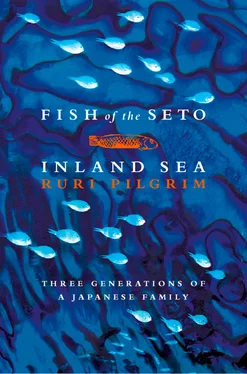Tei-ichi would have said that it was not a convincingly good match, but he found himself less particular than before.
âA merchant?â Kei raised her cleanly-arched eyebrows. Tei-ichi had felt the same mental reaction when he was told about the match.
Nearly half a century had passed since the collapse of the Tokugawa feudal regime. Tei-ichi reflected, âWhat a lot of social and technical changes and progress we have experienced.â Yet, he had to admit that he was not entirely against the old rigid class system. After all, when he was born, feudal lords were still travelling up and down the main roads to and from the capital which was called Edo and not Tokyo, in palanquins surrounded by samurais each bearing two swords and wearing a topknot.
Samurais were at the top of the class system in those days. They had the right to kill anyone, anywhere. The rice-growing farming class was the next in rank. Rice was important. The economic power of each feudal domain was determined by the amount of rice it produced. The samuraisâ stipend was calculated in rice. Then came the artisan class. The merchant class occupied the bottom position. They were not allowed to wear silk, and their houses were inspected lest they should be too luxurious. Dealing with money was despised and the profession whose ultimate purpose was the accumulation of wealth had to be at the bottom.
When Tei-ichi was little, his father told him a story about a castle which was besieged, and how the defending samurais had to eat the mud walls to survive. Even then, those who accompanied their lord to the peace negotiations in the enemy camp did not touch the food offered to them. They were so proud, and could withstand material temptation.
If he told such stories to his sons they would listen, but Tei-ichi knew that to his sons these were only epic tales. Times had changed.
âWell, we are living in a new age,â Tei-ichi said to Kei and Ayako. âWe cannot be prejudiced against new ways of thinking in the modern world. Our feudal period ended because the samurais could not maintain themselves economically and had to rely on merchants. You see, the standard of life was going up and up, yet the amount of rice produced could not be increased beyond a certain limit. It was the economy ...â
Tei-ichi showed his scholarship and would have gone on lecturing them with his interpretation of the arrival of the Meiji era, but the women did not seem to be impressed. They listened respectfully, but as soon as they were left alone, Ayako said, âItâs sad to think that the status of the Miwas has fallen, okahsan. In the olden times, no one considered it proper to think of such a match, however prosperous their business was.â
âOh, it is good to have a lot of proposals. To accept or refuse is our prerogative. We would worry about our fallen status if nobody thought of match-making with us,â Kei said, trying to cheer up Ayako and herself, and added with conviction, âItâs not the Miwasâ status which has sunk. It is the Tagawa-yasâ status which has gone up. That is what otohsan calls the new age. In ten yearsâ time, the likes of them will be members of the Prefectural Assembly and the National Parliament.â
In the end they decided to go ahead with the prospective match with Tagawa-ya. The draperâs son was in Tokyo. After graduating from one of the universities, he was staying on to study English, they were told. He had been hoping to go to Europe to learn business, as he was convinced that soon the time would come when people would wear more European clothes than the traditional kimono. However, the situation in Europe was taking an ugly turn and war was about to break out. He would stay home and wait for an opportunity. For the same reason Yasuharuâs plan of going abroad was postponed. It was 1914. Archduke Ferdinand had been assassinated and the ripples from Sarajevo were felt as far away as Kitani village.
When Tei-ichi heard of Tagawa-yaâs sonâs ambition, his last feelings of hesitation disappeared and he positively looked forward to the successful conclusion of the negotiations.
Kei and Ayako wanted to settle Takekoâs marriage within a year or two at the latest. There were two more daughters to think of and it was necessary for the eldest to marry, otherwise she would hinder the younger onesâ chances. Encouraged by her family, Ayako visited the go-between friendâs house.
âWe are very grateful that you have taken the trouble to think of my daughter, Takeko. We think that the match with Tagawa-ya san will be very desirable and I came to ask you to proceed with the negotiations.â
The friend also expressed in formal language her pleasure at being of use and promised to do her best to arrange the match, but she was slightly confused about who Ayako was until she had time to think about it.
âSurely she could not be older than her late twenties. No, if this is Takeko sanâs okahsan, she has to be at least about thirty-four.â The friend was calculating in her mind and admired how young Ayako looked.
Tagawa-ya himself was a plump and happy-looking man, with humble manners. On several occasions, when Kei and Ayako had visited the draperâs shop, he had been sitting among the young employees, greeting a customer, telling his assistant what to do, being consulted about what to buy. The shop was always full of customers and they could tell that the business was flourishing.
Ayako and the Shirais needed at least a year to prepare for the marriage. Once the marriage was finalised, there would be much to do. Since Takeko was marrying into a family which handled kimono materials, it might not be necessary to have a lot of kimonos made, but a chest of drawers, a dressing table, a desk, bedding, all had to be specially made. The lacquered utensils had to be ordered from Kyoto. Good lacquering would take over a year.
Since Ayakoâs wedding had been organised mostly by Shobei, it was Tei-ichiâs first experience of handling arrangements, and when he was shown the shopping list, he said with a sigh, âThey say three daughters are the ruin of a family, and they are quite right.â
Ayako had made up her mind to spend all that Shobei had left for his granddaughters on their weddings. It was the last luxury the Miwas would be able to afford.
About a month after Ayako had asked the go-between to proceed with the marriage negotiations, she came back to Kei and Ayako to tell them that Tagawa-ya was very pleased about the prospect of having Dr Shiraiâs granddaughter as their sonâs bride. They had sent someone to Takekoâs school to find out about her, and had heard that she was a very polite, gentle lady and there had never been any problems.
Tei-ichi was known among his neighbours as an honourable person, particularly since he had intervened in the family feud over the inheritance.
âThey also heard about your second daughter, Haruko san,â the go-between friend said, âand should you have already accepted another proposal for Takeko san, they would be pleased to ask for Haruko san. She seems to be a highly intelligent young lady and Tagawa-ya san thinks that she would be a very suitable wife for his son who also likes books and studying. After all, we are in a modern age. It is not shameful for a girl to like studying.â
âThat is very thoughtful of Tagawa-ya san, but Haruko is still only fifteen and we hope Takeko will make a good wife for their son,â Ayako answered politely.
The Shirai side wanted to settle the negotiations and exchange the gifts of engagement as soon as possible and were disappointed when nothing happened for a few months. The next step was to set a date for the meeting of the two young people before the marriage was finalised.
Читать дальше












